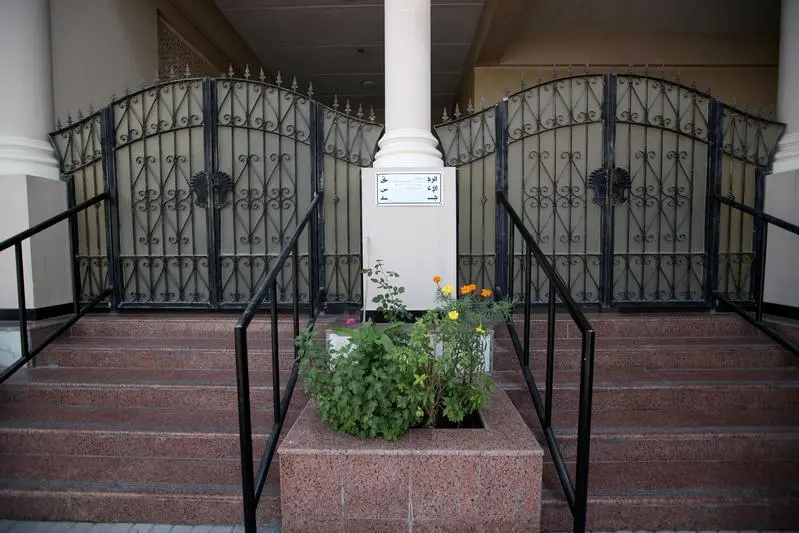PHOTO
Mosques across Bahrain reopened for morning prayers yesterday after being closed for more than five months following the outbreak of the Covid-19 pandemic.
Worshippers returned for the Fajr prayers amid mandatory measures in place to combat the spread of the virus, and ensure people’s safety.
Collective prayers in places of worship were suspended on March 23, and original plans to reopen in June had to be pushed back following a huge spike in the number of Covid-19 cases.
The decision to reopen worship places was taken last Wednesday by the Justice, Islamic Affairs and Endowments Ministry following a meeting between the Supreme Council for Islamic Affairs and the National Taskforce for Combating Coronavirus.
The mosques opened 10 minutes before the prayer, and worshippers were prohibited from staying in the mosque after praying.
Worshippers wore face masks at all times and their temperature was checked before they entered the mosque, ensuring they showed no Covid-19 symptoms.
Al Asala (Salafist) Bloc president and Shaikhan Al Farsi Mosque imam MP Ahmed Al Ansari said stringent measures were in place from the moment the announcement was made to reopen the mosques.
“Groups of community volunteers came forward to help with the resumption of prayers and ensure that things were being done according to Covid-19 regulations across the country,” he said.
“There were drills on different case scenarios on Thursday with every possibility taken into account in co-ordination with officials concerned.
“However, worshippers have to be sensible to avoid spreading the coronavirus and this can be achieved only through personal awareness.”
Southern Municipal Council member and Buhair councillor Abdulla Abdullatif said people were happy at the reopening of the mosques, but urged caution. “A disciplined approach to worship will send a positive indication that more prayers could be held, but one case of mass infection could result in the closure of mosques again,” he said.
“People thronged the mosques yesterday but only a limited number was allowed as per instructions.
“Things went very smoothly and as people get accustomed to the new normal they will themselves realise how to conduct themselves wisely.”
According to the mandatory guidelines, gatherings and crowding at the gates of mosques during entry and exit are banned, while a minimum two-metre distance between people has to be maintained at all times.
The mosques should open 10 minutes before the prayer, setting five minutes between the muezzin’s call and praying, and close 10 minutes after the prayer. Worshippers have to vacate the premises gradually and orderly, without any delay or overcrowding.
The ministry also urged people to perform Sunnah prayers (optional additional prayers) at home.
The sick, women and children aged under 15 are prevented from entering the mosques, while the elderly have been urged to perform prayers at home if there are legitimate reasons for that.
It is strictly forbidden for people, who are certain their presence in the mosque will spread illness or sickness, to enter the mosques; clear and deterrent penalties have been set for that.
People must perform ablutions before going to the mosques as ablution places, bathrooms, toilets, refrigerators and water taps at worship places will remain closed.
Worshippers must bring their personal prayer rugs and not leave them in the mosque after praying.
The guidelines make it mandatory to use hand sanitisers and disinfectants for clothes before entering, leave doors of the mosques open before and after prayers to ensure easy access and exit, and to prevent human contact as much as possible, with the handles being regularly sterilised after each prayer.
The use of Quran books is banned with worshippers instructed to read verses using their own Quran or cell phones, and avoid shaking hands.
Mandatory physical distancing has to be maintained between worshippers, in addition to sterilising chairs and limiting their number to the minimum necessary.
Entrepreneur Mahmood Al Nasheet, aged 47, who prays at the Southern Isa Town Mosque, said he was impressed with the awareness among worshippers.
“Careful procedures and awareness among people who came to pray made me feel relaxed as I prayed in the mosque for the first time in more than five months,” he told the GDN.
mohammed@gdn.com.bh
© Copyright 2020 www.gdnonline.com
Copyright 2020 Al Hilal Publishing and Marketing Group Provided by SyndiGate Media Inc. (Syndigate.info).





















